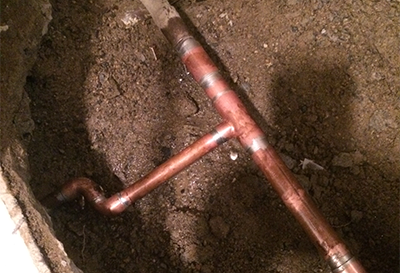We've stumbled upon the article on Detecting hidden plumbing leaks directly below on the internet and thought it made perfect sense to relate it with you over here.

Early detection of leaking water lines can alleviate a potential catastrophe. Some little water leaks may not be visible.
1. Check Out the Water Meter
Every house has a water meter. Checking it is a guaranteed manner in which aids you discover leaks. For beginners, switch off all the water resources. Ensure no one will flush, use the faucet, shower, run the washing machine or dishwasher. From there, most likely to the meter and watch if it will transform. Since nobody is utilizing it, there should be no motions. That shows a fast-moving leak if it moves. If you find no modifications, wait an hour or 2 and also inspect back again. This suggests you may have a slow-moving leakage that could also be below ground.
2. Inspect Water Consumption
Analyze your water expenses and also track your water usage. As the one paying it, you should observe if there are any type of discrepancies. If you identify sudden changes, despite your intake being the same, it implies that you have leakages in your plumbing system. Bear in mind, your water bill must drop under the same array each month. A sudden spike in your costs shows a fast-moving leakage.
Meanwhile, a stable boost on a monthly basis, despite having the exact same habits, reveals you have a slow leakage that's also slowly rising. Call a plumber to thoroughly check your property, specifically if you really feel a warm area on your flooring with piping underneath.
3. Do a Food Coloring Test
When it comes to water usage, 30% comes from commodes. If the shade somehow infiltrates your bowl throughout that time without flushing, there's a leak in between the storage tank as well as bowl.
4. Asses Outside Lines
Do not forget to check your outside water lines also. Must water seep out of the connection, you have a loosened rubber gasket. One tiny leak can waste heaps of water and also spike your water bill.
5. Assess the situation and also inspect
House owners ought to make it a behavior to inspect under the sink counters and even inside closets for any type of bad odor or mold and mildew development. These two warnings indicate a leakage so punctual focus is called for. Doing routine inspections, also bi-annually, can conserve you from a major issue.
More notably, if you understand your residence is currently old, keep a watchful eye on your heating systems, tubes, pipelines etc. Check for stainings and also damaging as many home appliances and also pipes have a life expectancy. They will certainly also normally deteriorate due to tear as well as use. Don't wait for it to rise if you believe leaking water lines in your plumbing system. Call an expert plumber right now so you don't wind up with a dreadful mess in your home.
Early detection of leaking water lines can reduce a possible disaster. Some small water leakages might not be noticeable. Examining it is a guaranteed method that aids you uncover leakages. One small leak can throw away heaps of water and spike your water costs.
If you think dripping water lines in your plumbing system, do not wait for it to escalate.
Tips for Detecting Hidden Plumbing Leaks
Check for Signs of Water Damage
We recommend that you check the following places for evidence of water damage:
Near where you store your water heater
Around your sump pump
In areas where pipes are visible
Underneath cabinetry or a vanity beneath a sink
Where your outside hose bib isIf water damage is present, you may also notice mold and/or mildew or smell a foul or musky odor. You might also be able to hear the sound of water running where it shouldn’t be.
Perform a Water Meter Test
One of the easiest ways to determine whether you have a hidden leak on your property is to test your water meter. Turn off all appliances in that use water and make sure you don’t have any faucets running. Locate your water meter and record the reading on it. Continue to leave everything off for a minimum of two hours and then go back and see the meter reading. If it’s a noticeable difference, chances are you have a hidden plumbing leak.
Monitor Your Outside Usage
As the seasons change, you might use more water to keep your yard lush and green and your flowers blooming. However, it’s important to routinely ensure that your sprinkler or irrigation system is working properly and that any outside faucets are completely off. This way you’re not wasting any water.
Do the Toilet Food Coloring Test
Are you kept up at night because your toilet continues to run? If you’ve noticed your toilet randomly refills, especially when it’s not in use, it could mean you have a defective flapper tank and water will leak into the bowl. Fortunately, there’s an easy (and kind of fun!) way to test whether you’re dealing with this issue. Grab some food coloring and add a few drops into your toilet’s tank. Wait 15 minutes and then check to see whether the water in the bowl is colored. If it is, you have a leak within your toilet and the internal assembly will need to be repaired or replaced.
https://www.carterservices.com/blog/2020/february/tips-for-detecting-hidden-plumbing-leaks/

As an enthusiastic person who reads about Locating water leaks, I thought sharing that excerpt was mandatory. Sharing is nice. Helping people is fun. Thank-you for your time spent reading it.
Booking Page